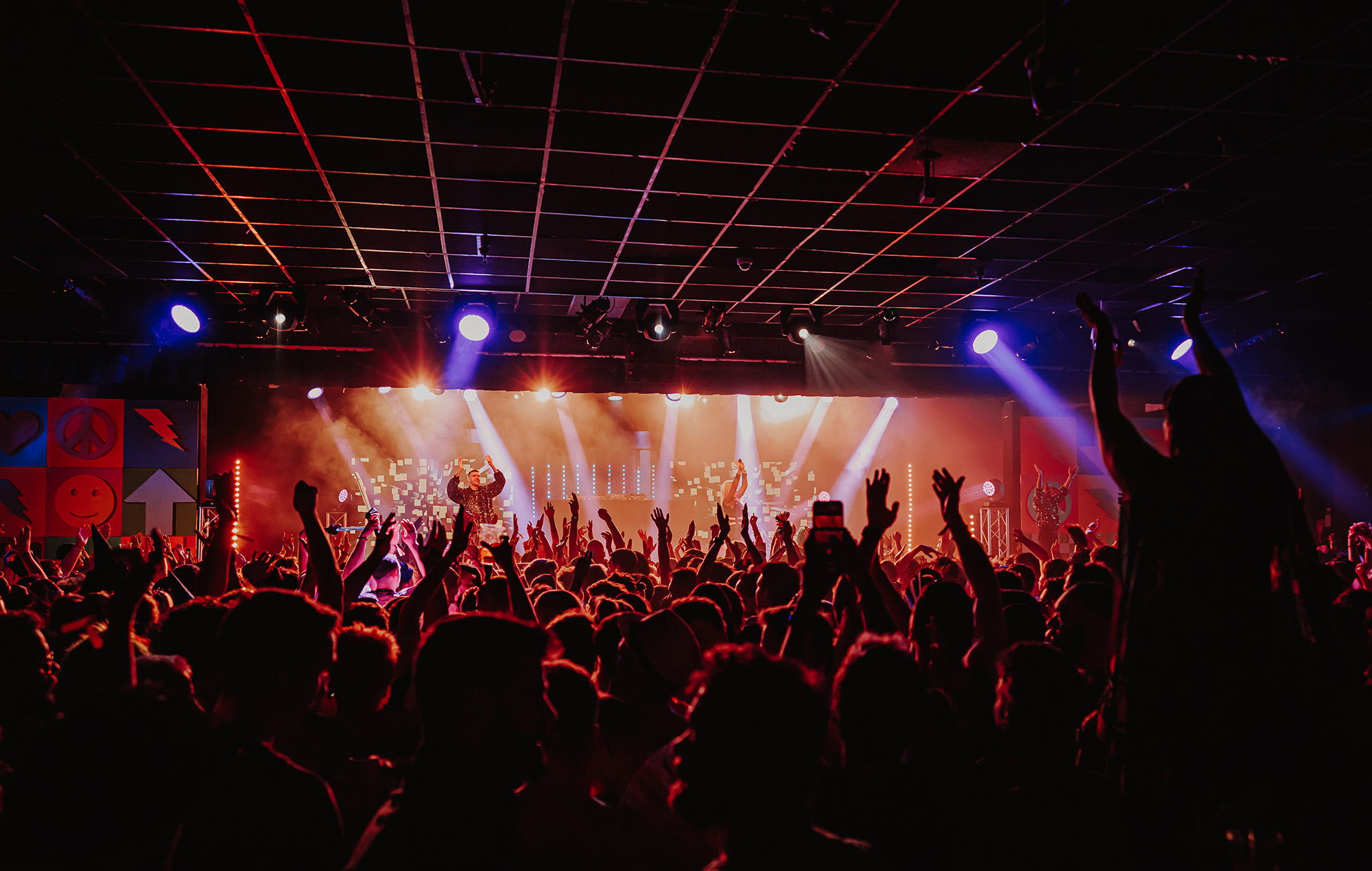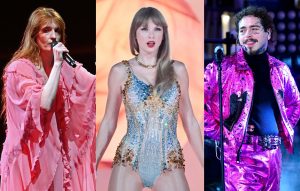While your typical English music festivals tend to show landmark sporting occasions on big screens after requests from fans, the Mighty Hoopla Big Weekender is worlds apart from your standard cider-chugging muddy field. The event – which takes place at Butlin’s in Bognor Regis – had its own unmissable TV moment.
NME is at the British holiday park for a weekend of music, fun, campness and community. But first, on the opening Friday night, it’s time for the finale of BBC’s hit reality TV show The Traitors… but only after a personal message from cult hero of the moment, Queen Diane. With a Winkleman of Claudias stalking the room in the host’s trademark fingerless gloves, dark eye make-up and roll-neck jumpers, it’s clear that everyone who has descended on West Sussex’s seaside town Bognor Regis is living for the drama. As Hunsnet enthused on socials, the deafening reaction to the big reveal “was like the World Cup for Huns”.
Mighty Hoopla Big Weekender. Credit: Luke Dyson
This introduction to a proudly unique weekend is indicative of the type of event that Mighty Hoopla has been since its arrival in 2016: its an all-embracing celebration of pop music icons and queer culture. “As with everything we’ve done, it was born from the idea of building a space that doesn’t exist,” reflects co-founder Jamie Tagg when NME catches up with him on-site.
Since the Mighty Hoopla family first made Bognor their home, and with the addition of a sparkling London festival in 2017, the festival has become one of the UK’s most original and beloved events. While this summer’s two-dayer in Brockwell Park in south London will welcome Jessie Ware, Kim Petras and Nelly Furtado, 2024’s Big Weekender sadly marks the crew’s final pilgrimage to Butlin’s. Its future elsewhere is yet to be confirmed, but it marks the latest worrying sign for British events.
“We’ve had such a beautiful run, and we’re not closing the door, but there’s other things we could do that the crowd could enjoy more for the price,” Fussell says. They cite the impact of rising travel and booking costs as to why they’re leaving Butlin’s. “It can cost more to bring an artist to Bognor than London because of where it is, and we don’t want to pass that cost onto the customer.”
The loss is the latest blow to the country’s cultural offering, with venues already on the ropes and similar seaside resort events across the country under threat. Legendary hardcore rave-up Bangface is being forced to relocate following the closure of its home at Pontins in Southport.
While there are other successful Butlin’s weekenders – Rockaway Beach brought Sleaford Mods, Bob Vylan and Dream Wife to Bognor in early January, and Fatboy Slim’s All Back To Minehead caters to dance and rave fans specifically – neither have built such a strong cult fanbase as Mighty Hoopla.
Read more – Why have so many UK festivals been cancelled or postponed?
Mighty Hoopla Big Weekender. Credit: Luke Dyson
Its popularity will come as little surprise: Tagg and co-founder Glyn Fussell were also the brains behind drag heroes Sink the Pink and club nights Rebel Bingo and Guilty Pleasures. Initially, the groups toured the UK festival circuit together in the early 2010s.
“The first thing everyone would ask each other at check-in would be ‘what shit stage are you on?’ because the organisers didn’t know what to do with us,” Tagg recalls. “We were giving our magic to other festivals,” Fussell adds. Worse still, Fussell remembers incidents of drag performers he had booked being booed off festival stages. “They came out with fans and the lads were so challenged by their own sexuality,” he says. “It was heartbreaking because I had to tell them ‘we’re not welcome here.’”
This lack of acceptance led to Tagg and Fussell deciding to create a festival of their own that they could control. In 2016 the Mighty Hoopla Big Weekender was born, resulting in a collective community forming. While a Sink The Pink crowd turned up (many with passports as they had no clue where Bognor was), the Butlin’s team also invited some of their regulars. “When they met, we were like ‘what have we done?’ It was like two tribes looking at each other and, within minutes, it was a party,” Fussell says. “We felt like geniuses: going from sheer fear to joy.”
Katy B performing at the Mighty Hoopla Big Weekender. Credit: Luke Dyson
The seaside resort has been the go-to place for British families to have affordably-priced, fun-filled holidays since 1936. For decades, its child-friendly entertainment programme has seen Redcoat performers take to the stage, while more recently it has hosted magic shows from TV presenter Stephen Mulhern.
“It’s reclaiming spaces that you don’t feel were suitable or fitted you and your community when you were younger,” Tagg says. “As a working class little gay boy, I would have never felt comfortable coming here and going to Splashworld [the site’s water park], or even just walking around a Butlin’s. Much in the way that I was raised in working men’s clubs and never felt comfortable in them. It’s about rewriting the narrative, but with lots of camp bells and whistles”.
While Fussell feels it’s important that queer events are for queer people, with Mighty Hoopla they also wanted to “break the barrier and start recruiting allies. People who come here may not have been to an LGBTQIA+ event but think it’s really fun and want to protect it and be a part of it.”
Mighty Hoopla Big Weekender. Credit: Luke Dyson
The Bristolian comedian Jayde Adams feels similarly. “I played a Madness weekender [at Butlin’s] and I was booed off the stage”, she recalls. Returning to Butlin’s, this time at Mighty Hoopla Big Weekender, three years in the trot “healed her”. Fussell now describes Adams as “part of the furniture”.
What is it that keeps Adams coming back, though? “When you’ve got something slightly different about you and you’re othered throughout your life, when you can get together with a bunch of other people that have been othered, you don’t feel so othered anymore,” she says. “You feel like you’ve got a community, and this just strengthens confidence,” she adds. “You’ve got like-minded souls together in a big space. Gays just want to be safe in their own space and this is what that provides. Who knew Butlin’s in Bognor Regis could be such a queer space?”
Take this year’s music programme which boasts Whigfield on Saturday night (obviously), ‘00s Eurodance queen Cascada and Natalie Imbruglia who has thousands belting out break-up ballad ‘Torn’ together. There’s also a drag brunch, Bongos Bingo, after-hours karaoke hosted by X Factor cult hero Diana Vickers, pool parties, cabaret and music video choreo with Little Mix’s choreographer Claud Neto. The site’s go-karts, fairground rides and (late night) bowling complete the throwback of an authentic Butlin’s experience.
An effortlessly inclusive, cross-generational haven, the extroverted crowd are keen to get involved. At Saturday night’s flesh-baring musicals-themed fancy dress party the costumes are next level: where else can you find Mormons, wizards, nuns and Mrs Doubtfire on the same dancefloor?
Diana Vickers performing at the Mighty Hoopla Big Weekender Credit: Luke Dyson
Toby and Micki Ford – winners of this year’s fancy dress competition – are effusive of Mighty Hoopla’s appeal. “It’s the only festival that allows us to express our creativity, and where we know it will be accepted,” Micki says. The non-fancy dress outfits – faux fur coats, cowboy hats, glitter – are equally as fabulous.
By Sunday evening’s ‘End Of The World Party’ – which has its own apocalyptic midnight snowstorm – the stages are still packed with diehards doing their utmost to ensure this holiday camp escape goes out with a bang. 48-hour party people, indeed.
It is, potentially, not definitively the end of the Big Weekender. Performers hint at a new future, while Adams dropped an even bigger hint in her chat with NME when she teased that the team is “going global, baby!” Postcards on tables that read ‘bye bye Bognor. Hello…’ fuel the rumour mill. “A beach and some sunshine would be nice,” Fussell hints. “We’ve got to go somewhere different.”
Whatever the future holds for the Mighty Hoopla Big Weekender, its singular magic needs to be protected and treasured, especially at a time of uncertainty in the music industry. As ‘90s legend Whigfield reflected on her holiday camp experience, “I’ve been coming here for so many years, I feel like I wanna live here and I wanna die here!”
The post Mighty Hoopla: why losing the holiday camp festival would be devastating for pop and queer culture appeared first on NME.




